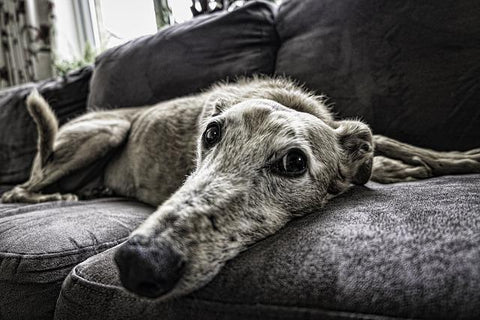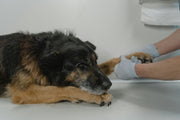
Have you caught your dog biting or chewing on his fur or skin? Dogs will get itchy just like us and scratch every once.
However, if you see your dog biting or chewing on his fur obsessively, it is likely because something is bothering him.
Here are some common symptoms usually associated with a dog biting or chewing himself:
- Itching, scratching, licking
- Head shaking
- Ear infections, eye infections
- Secondary skin infections
- Hot spots
- Hair loss
- Diarrhea, vomiting
If you notice any of the symptoms above and your dog biting or chewing himself, you should consult a veterinarian to understand what the root cause may be.
In most cases, you should be able to resolve this issue with the help of your veterinarian.
Once the root cause is detected and cured, your dog should stop demonstrating the symptoms we listed above.
8 most common reasons for dog chewing himself

Fortunately, the reasons behind a dog biting himself or chewing himself are usually listed below. However, it may be difficult to fix the root cause depending on the reason.
It may be stressful and worrisome for pet owners to see their dog constantly scratching.
Constant scratching or constant itching may lead to infections, leading to more scratching. Therefore, it's essential to detect this behavior early on and bring it to your veterinarian's attention.
Keep in mind that this issue affects many dogs, and you are not alone in this situation. Let's review the common reasons for dog chewing behaviors and help your dog stop biting himself.
Dry skin
Dry skin is often just the external symptom of a root cause happening inside your dog's body.
However, dry skin or paws may entice your dog to scratch and lick the affected areas.
A dog's skin may become dry due to allergies, which we will cover below, dry or cold weather, lack of fatty acids, and excessive bathing.
When bathing your dog, try to use a hypoallergenic oatmeal-based shampoo for dogs. Also, consider using a topical for dry dog skin such as a paw balm or a conditioner:
- Paw balm or skin balm: you can shop for hydrating soothing balms specifically made for dogs. I will link to ours, which is USDA Certified Organic and safe to lick: Petsmont Organic Touch & Heal.
- Conditioner: you may consider using some dog condition on your dog's skin and coat. I would recommend Organic Coconut Oil since it is versatile, soothing, and healthy.
Usually, even though these products may not fix the underlying issue causing dry skin, they may be sufficient to help your dog with skin irritation and to help with intense itching.
Food allergies and environmental allergies

If your dog suffers from a food allergy or is triggered by environmental allergens, this will most likely result in him biting himself or scratching.
While it may be hard to diagnose allergies, it can be easy for your veterinarian to rule out all the other causes.
If your vet cannot find a reason for your dog's behavior, it may be because your dog is allergic or intolerant to certain ingredients.
Certain kibble ingredients like beef, chicken, wheat, and corn can trigger an allergic reaction in skin changes. Also, grass, pollen, and dust mites may be environmental allergens your dog is sensitive to.
I will recommend some options below in the article to help your dog with his allergies if you suspect that to be the case.
Skin disorders
Certain skin disorders can result in scratching, hot spot, and extreme itchiness. One of these skin disorders, seborrheic dermatitis, results from your dog's sebaceous glands overproducing sebum.
Your dog's skin will flake off in scales or look inflamed if this happens. Your dog might start scratching or chewing at his fur to relieve himself.
If you notice a foul odor near your dog's skin or fur, it could be seborrheic dermatitis. Once again, this diagnosis should be performed by a veterinarian.
Bacterial infections, fungal infections, and yeast infections

You may have heard of secondary infections before. They are usually referred to as:
- Bacterial infections
- Fungal infections
- Yeast infections
These secondary infections occur when a primary issue lingers.
For instance, the constant dog scratching may result in an open wound and, if left untreated, can quickly develop into an infection. These infections result in intense itching and pain.
Your veterinarian will be apt to diagnose these issues and recommend antibiotics and medications needed to resolve them.
Insect and parasite bites
Some dogs can be particularly sensitive to flea bites and have flea allergy dermatitis, an allergic reaction to flea saliva. Other parasites like ear mites can also trigger intense itching.
Unfortunately, a single bite from a flea can trigger an allergic reaction. Therefore, it's important to have year-round protection against fleas and ticks and choose products that are not harmful to your dogs.
Certain chemical-based flea collars are known to trigger hot spots and inflammation. Other flea treatments need fleas to bite before being killed, which means it is already too late, and your dog will get a reaction from the bite.
However, inspecting your dog's skin and fur for parasites can be helpful in understanding the reason behind your dog biting or chewing himself.
Certain parasites like ear mites are invisible to the naked eye but can be detected using a skin scrape at your veterinarian's office.
Pain, soreness, and inflammation

An even harder to diagnose the reason behind itchy skin is if dogs suffer from internal pain such as arthritis. Other times, your dog may have hurt himself on something sharp or irritating.
Your veterinarian can help diagnose internal issues, and you can also take a close look at where your dog bites to see if this could explain it.
Hormonal imbalances
A dog's skin is more susceptible to getting infected with a hormone imbalance. Most of the time, it lacks thyroid hormones (hypothyroidism) and overproduction of cortisol (hyperadrenocorticism).
Stress, anxiety, and boredom

Separation anxiety and boredom are two common culprits of excessive licking and chewing. Dogs require companionship and stimulation.
If your vet cannot diagnose any issue listed above, you should consider increasing the stimulation of your dog and helping him with his separation anxiety.
You may consider getting some puzzle toys to keep him busy in your absence and increase his walks or even go on a run together. Here is how long to walk your dog based on his breed.
How to prevent or treat the reason behind your dog biting himself
Depending on the reason behind this behavior, you may be able to help your dog at home and with your veterinarian's guidance.
Vet-recommended medication

Whether your dog has skin infections, external parasites, a bacterial infection, or something else, your vet will be able to recommend medications to best take care of the issue. It may include antihistamines, corticosteroids, antibiotics, and topical treatments.
Remember that the meds will not address the underlying issue in some cases, such as allergies.
Try a different diet
If you suspect allergies, you should look at your dog's diet because, more often than not, allergies stem from foods your dog is intolerant to. Veterinarians suggest that about 10-20% of allergies are food-related.
However, your dog may be intolerant to some ingredients without being allergic to them and still trigger skin reactions.
Studies show that in most cases, the protein is the cause. Therefore, consider switching the protein source of your dog's diet to another one. Also, try to avoid grains, dairy, and soy.
Your dog's food is the first step to supporting your dog's health.
Consider anti-parasite treatments

Fleas and other parasites can trigger skin issues; consult your veterinarian for the best year-round options for your dog. Also, keep in mind that some treatments may trigger skin reactions because of the chemicals they contain.
Wipe your dog after walks
Unfortunately, many environmental allergens will contact your dog's body whether you would like it or not. In this case, all we can do is help manage. You may wipe your dog's paws and belly after walks.
You may also have your dog wear dog shoes and a raincoat if it proves useful to your dog, although he may not like it at first.
Limit exposure to airborne allergens
You may not be able to manage airborne allergens outside. However, a walk around the neighborhood may prove easier on your dog's skin than in the woods or at the park.
Please consider buying a special HEPA filter for your home to clean the circulating air of common airborne allergens.
Bathe your dog regularly

Another simple home remedy is to bathe your dog. This will help remove allergens stuck to your dog's coat and is a good grooming routine. Finally, choose a sensitive skin shampoo, preferably with oatmeal and organic.
Instead of blow-drying your dog after bathing him, which could further dry his skin, consider towel drying him. Research how often you should bathe your dog, depending on his breed and coat type. Adjust the frequency based on how much it helps with his allergies.
Add omega supplements to your dog's menu
Did you know that by adding Omega 3 fatty acids to your dog's diet you could, in some cases, completely relieve his skin issues? Unfortunately, this information is not coming from pet owner reviews on Omega 3 supplements.
Omega 3s are extremely beneficial to dogs' skin and coat, and AAFCO approves this claim.
These fatty acids support the immune system, which is stronger to fight off allergies before they have time to develop. There are various ways to add Omega 3s to your dog's diet:
- Adding fresh fish such as sardines or salmon. This may be pricey and more preparation work, but it's also more nutrient-dense.
- Adding a supplement to their food, such as salmon oil. Salmon oil is known to help with itchy skin.
Answers to some common questions
Find below additional answers to common questions pet owners ask about dog scratching, food allergies, environmental allergies, and red bumps they notice on their dogs.
Why does my dog keep scratching but no fleas?

Various reasons can explain why your dog scratches even though he doesn't have any fleas. One flea bite is enough to trigger an allergic reaction, and it may be near impossible to find that flea. More importantly, other underlying issues such as allergies or skin infections are the most common causes of scratching.
How to treat and stop my dog's itchy skin
You should consider a vet visit to get a treatment plan or know the best treatment based on your dog's medical history. Your vet will examine your dog's body to determine the cause behind your dog's itchy skin. You can also use various home remedies to temporarily soothe your dog's skin, such as using a dog paw balm.
My dog keeps biting himself but no fleas
If you notice your dog is biting himself but doesn't have fleas, he may have dry, irritated skin due to an underlying condition. Grass, seeds, pollen, and dust mites could trigger an allergic reaction, and so can a few food ingredients. Consult your vet to determine what the underlying condition is so that you can best treat your dog's skin.
How can I get my dog to stop chewing his paws?
Dogs often chew their paws when their paws are dry and irritated. It would help if you considered using a dog paw balm as a topical, temporary relief to your dog's chewing. Then, you should consult your veterinarian.




